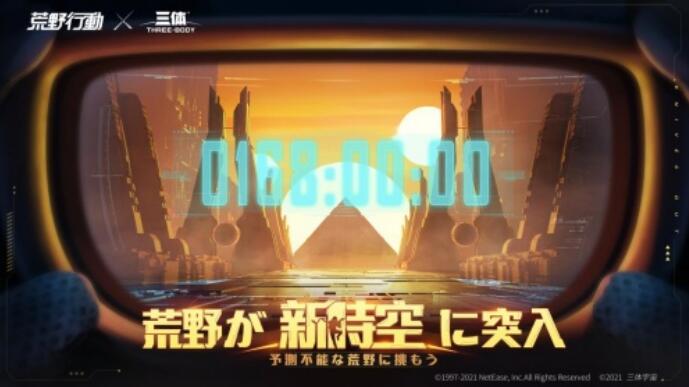"Knives Out" and "The Three Body Problem" Bring Chinese Sci-fi to Global Audiences
Recently, the Chinese-developed mobile game Knives Out announced its global crossover event with the popular sci-fi IP, The Three Body Problem.
According to reports, the crossover event will include faithful recreations of many notable scenes The Three Body Problem, transform the futuristic and sci-fi-style items featured in the novels into interactive in-game items, as well as presenting descriptions that could once only be understood through text to players in a vivid, interactive form. With Knives Out being one of China's outstanding mobile games that has found success overseas, and The Three Body Problem being a representative Chinese work in the sci-fi genre, what sort of great cultural strides can they make together? The announcement was met with excitement from global fans of The Three Body Problem and the wide community of players alike.

The Three Body Problem, as China's most famed sci-fi work, broke into the genre from a Chinese perspective with both extraordinary imagination and sci-fi aesthetics, winning it the highest honor for science fiction globally: the Hugo Award. Upon release in Japan, the series of novels exploded in popularity and has since been reprinted multiple times. As a Chinese-made game that's managed to firmly root itself in overseas markets, Knives Out has been selected twice as one of the top ten most influential games on Twitter. It stands out in the Japanese market—in a country famous for its own domestically-developed games—and tops discussion and traffic rankings in Japan all year round. Now, the presentation of Chinese sci-fi in-game, supported by Knives Out's rich interactive support, has given The Three Body Problem even more space for its imaginative contents.
Wide-spread consumption of sci-fi literature has also increased in recent years, forming a new trend. With the rise of various forms of entertainment such as games, movies, TV, and cartoons, as well as the integration and development of sci-fi literature and multimedia, the imagination behind the writing can be vividly interpreted to reach the public in a more accessible form, and even go so far as to become a topic of global discussions.
With its own digital capabilities and communication advantages, through this crossover event, Knives Out will present the imaginative contents of The Three Body Problem through visuals, environments, and immersion so that overseas players can feel the creativity of Chinese sci-fi within the game. To a certain extent, this will also further expand the global influence of The Three Body Problem, showing more people the progress and breakthroughs of Chinese sci-fi works through innovative forms and introducing this sub-genre to the world.
We can see that, just as sci-fi transmits knowledge and expands the mind, games—being important modern carriers of culture—are continuing to explore and expand China's cultural window to the outside in many ways. As a national-level e-sports game in Japan, Knives Out previously added the WZ-10 Helicopter and the QBZ-95 Rifle, a Chinese-made weapon, to show the power of Chinese arsenals. Three Kingdoms elements were also added to the game and given a fresh coat of paint for a new era to introduce a distinctive part of Chinese culture to the world. Knives out has also collaborated with the Chinese Academy of Sciences to launch the "Knives Out Space Project" to transform aerospace knowledge into educational content and raise public awareness of Chinese aerospace achievements both at home and abroad.
Sci-fi and games are intertwined with humanity's imagination of the future, but they also accumulate and condense cultural powers to be become bridges that connect people, as well as bridges that connect cultures. When games and sci-fi are combined, thousands upon thousands of people can cross the imaginative, "connect" the stars and universe, talk within science fiction, and communicate in-game. We expect more and more outstanding Chinese enterprises to emerge, innovate, and forge ahead to show the world China's imaginative side.

